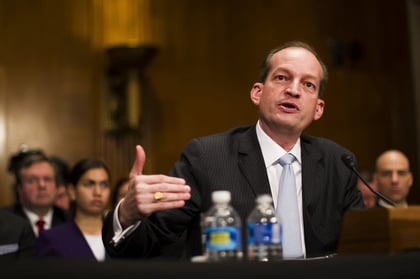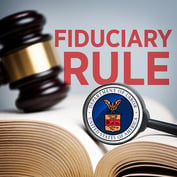 Labor Secretary Alexander Acosta must balance political and institutional pressures in determining whether to continue defending the fiduciary rule. (Photo: Diego M. Radzinschi/ALM)
Labor Secretary Alexander Acosta must balance political and institutional pressures in determining whether to continue defending the fiduciary rule. (Photo: Diego M. Radzinschi/ALM)
Ever since the U.S. Chamber of Commerce and other trade groups began filing lawsuits to overturn the Labor Department’s fiduciary rule in 2016, legal experts have speculated the issue would ultimately find its way to the Supreme Court.
But an agreement between Labor and the National Association for Fixed Annuities last week in the District of Columbia Court of Appeals has made the fiduciary rule’s imminent path to the Supreme Court less certain.
NAFA, a trade group representing annuity providers and distributors, and the Trump administration’s Labor Department agreed to voluntarily dismiss an appeal of a lower court decision upholding the fiduciary rule.
That decision takes the possibility of a pure circuit split off the table, after the 5th Circuit Court of Appeals’ decision to vacate the fiduciary rule.
Kevin Walsh, an attorney with the Groom Law Group, says the agreement struck in the D.C. Circuit has consequences for Labor’s ultimate decision to appeal the ruling in the 5th Circuit to the Supreme Court.
“It’s more likely DOL does not appeal the 5th Circuit decision,” Walsh told BenefitsPRO, a partner site to ThinkAdvisor.
Labor Secretary Alexander Acosta must balance political and institutional pressures in determining whether to continue defending the rule, Walsh said.
On the one hand, the department must consider the political implications of a presidential memorandum issued shortly after President Trump was inaugurated. That memo ordered the Labor Department to re-examine the market implications of the rule.
Also, dropping its defense of the rule would clear the way for Labor to pursue retirement policies favored by Republicans, like lifetime income options and electronic disclosures for retirement accounts.
On the other hand, Labor has an institutional interest in continuing to defend the rule. Many of the career employees behind the rule under the Obama administration remain at Labor, which is charged with protecting the interests of retirement savers.
Walsh is predicting politics will likely win the day.
“Politically, there is big pressure to drop the appeal. That would be consistent with the Trump administration’s deregulatory agenda, and allow regulators to move on to other priorities,” he said.
“I think it’s likely the political considerations will outweigh DOL’s institutional concerns,” added Walsh.









 March 27, 2018 at 03:50 PM
March 27, 2018 at 03:50 PM










